- Home
- Taylor Caldwell
Wicked Angel Page 2
Wicked Angel Read online
Page 2
“Do try and keep Elsie,” said Alice, while Kathy covered the soup pan with the hushed care of one handling a holy thing. “She’s very good.”
“Let’s change the subject,” said Kathy, in her natural voice, which was hard and flat. “You asked me what I wanted for my birthday. You have only your salary, and you’re spending your first year’s savings at the university, and heavens know why! Well. I’d like an automatic fryer.”
“That’s about thirty-five dollars,” said Alice, in an expressionless tone.
“Yes. Very cheap, isn’t it?” Alice thought of the small sum remaining in the bank. This was only the middle of August. She would not receive her first paycheck for over a month. Of course, she thought, I can always charge it, and pay for it in October.
“An automatic fryer, then, it is,” she said. Her eyes, a blue much darker than Kathy’s, and filled with the radiance of intellect, clouded a little. She detested being reminded of her sister’s native avarice. Kathy gave her a peeping glance.
“You really should get married, dear,” she said. “You’ll soon be nineteen, and it’s time for you to be looking around for someone substantial and responsible, like Mark. You’ll never realize the joy of marriage until you have a child like Angel!”
“I thought the joy of marriage was in the husband,” said Alice dryly.
“Don’t quibble. Mark’s a darling, of course. But marriage means children.”
“Why don’t you have another, then?” asked Alice. She was distressed to hear a faint taunting note in her own voice, but she was thinking of Mark, who existed, in Kathy’s mind, as the father of her child and the provider of his comforts and the means of creating a large inheritance for him.
“Oh, how can you say that, Alicia!” cried Kathy, in a despairing voice. “I had such a hard time when Angel was born!”
“And besides,” said Alice, and wondered at herself, “thirty-five is a little old to be having more children, isn’t it?”
There was a sudden silence in the hot bright kitchen. Kathy’s face took on a shade of venom, and her eyes sparkled. Then Elsie, her features set sullenly, entered the room, and Kathy said with sharpness, “It’s five minutes after four! You were supposed to be down here five minutes ago!”
“I’m tired, Mrs. Saint,” said Elsie. Her tone was ominous, and Alice knew immediately that good Elsie was preparing to leave in a short time. But Kathy never knew, or cared. There were countless Elsies just waiting to be exploited, if only for a few weeks, at a small salary, and most easy to deceive with a beguiling smile and honeyed lies.
“How are you, Elsie?” asked Alice, going to the girl who was beginning to wash some dishes. Elsie looked over her shoulder at the younger girl, and smiled. Now, she thought, Miss Knowles was a really lovely person; you never knew how lovely she was until you’d seen her a few times. Elsie regretted that she would not see Alice again.
“Fine, Miss Knowles,” said Elsie.
“Do hurry with those dishes!” said Kathy. “It’s almost time for Angel’s little snack.”
The boy heard his name once more, and he smiled in beatitude. He stood up, reached high for the knob of the screen door and entered the kitchen, stamping his feet loudly. His smile disappeared; he began to whine fretfully, and gave Alice a malevolent look. Alice returned this with a regretful smile. It was dreadful to hate the child. Was it Kathy’s fault? Alice silently shook her head. She hoped it was so, and often she prayed that Angelo would improve as children had a habit of improving when the world assaulted them with reality and refused to coddle them as their mothers coddled them, and demanded of them some semblance of humanity and decent behavior, or be rigorously punished.
When Kathy saw her son her face radiated pure light. She swept him up into her arms with a cry of ecstasy, almost lascivious in its undertone. She pressed him to her breast and covered him with kisses. She knew the exact posture to take, legs a little apart, supple waist bent backwards, one shoulder raised a trifle, one arm about the boy just so, the other arm lifted and the hand curled and caressing, to create a charming picture of mother and child. As usual Alice thought to herself, and again with regret, that Kathy was a very amateur “ham.” She wondered if Kathy assumed this posture without an audience. It was very possible. Alice regarded Angelo gravely, as his mother kissed and fondled him, and he grinned at her with knowing malice, for he was a very intelligent child with every child’s acute awareness of the emotions of adults.
He was much larger than the average child his age, and muscular rather than fat, and he was quite the handsomest boy Alice had ever seen. She taught young children a year or so older than her nephew, and some were handsome and some were pretty. None could compare with Angelo. He had been born handsome, with no redness, no withered skin, no distortions, no simian resemblances. At birth, his hair was as crisply curled and dark red as it was now, his light brown eyes as big and shining, his skin as smooth and fair, his lips as pink, his cheeks as dimpled, his nose as well-shaped, his chin as round and firm, his ears as excellently formed. He had had none of the unfocused stare of the usual baby; almost from birth he seemed acutely knowing. He resembled his parents. He had Kathy’s overt charm, her fascinating smile, her coaxing ways, when it pleased him to coax rather than demand with screams of rage. His profile sometimes reminded Alice achingly of his father, and so her hatred was not always steadfast.
“My precious one!” Kathy sang, and began to whirl about the kitchen with the big boy in her arms, her skirts lifting and swaying, her bright auburn hair flying about her face. “My darling! Mother’s adorable! Mama’s delight! Oo, oo, oo!”
Angelo’s gaze never left Alice’s averted face, and he chuckled, and when he pinched his mother’s cheek his touch was less savage and deliberately hurting than usual. Kathy kissed the strong, tanned fingers, and threw back her head to let her worshiping eyes look upon her child. “Oh, Alicia!” she sang lyrically, “this is what I mean about marriage!”
She let Angelo slide to the floor, following his passage with kisses on random spots. “Oh, Alicia! Don’t you miss him, now you’ve left him?”
Alice said, “I wish you’d call me by my right name, Kathy.” She looked about for her purse, then remembered she had left it in the hall. “I really must go. I have at least four hours’ study waiting for me.”
Kathy said, in her hard change of tone, to Elsie, who was regarding Angelo with a curious expression, “Take Angel to the powder room. It’s been two hours!”
“No!” shouted Angelo, stamping his foot. “I don’t want to go!”
“Oh, darling, you must, you must. You know how you love the pretty green potty in the powder room. But would you rather go upstairs?” She half squatted before him, with her head cocked like an adoring dog, her eyes intent and anxious.
“No, no!” he shouted, and beat his strong feet on the coral linoleum tiles. “I want the green potty!”
Can’t she keep her hands off him a minute? thought Alice, disgusted. She mauls him all the time.
Kathy squealed with joy at her son’s decision, and clapped her hands. She lifted him in her arms again. “I’ll take you!” she said in that singing voice, and left the kitchen with Angelo, and entered the large cool hall whose floor was covered with black and white glimmering marble. Alice could hear the quick pattering of her footsteps on the stone, and her constant, murmurous words of endearment. Alone with Elsie, she said in a low voice, “Elsie, this job isn’t too bad. Why don’t you stay?”
Elsie answered at once, and simply. “You know I’m going, Miss Knowles? Then you must know I just can’t stay. I’m sorry, but it’s that—that kid. He kicked me twice today, and I’ve got bruises on my shins. And I can get much more somewhere else, and more time off. Mrs. Saint said I could have practically every evening off, except when they went out, and it isn’t so. I have to sit up there with that—kid—and watch him breathe and sing to him until he’s asleep, except the times Mrs. Saint wants to sing him to sleep or read to him. Ev
en then, I’ve got to be around to do anything he wants, if he wakes up. And they have a lot of company, Miss Knowles. Last week, there was only one night when they didn’t, and I didn’t get through until twelve o’clock, and I have to be up at six. I wouldn’t have taken the job, if I’d known,” she added, with bitterness. “Too much work; I’ve got to go every second. If I sit down, Mrs. Saint finds something for me to do. I’m sorry. She’s your sister, and I guess I shouldn’t be talking this way.”
She regarded Alice, troubled. She was a strong, short girl, clean-looking and with an air of self-respect, and her brown hair was neatly combed and her brown eyes were firm and without guile. Alice sighed, and looked at the floor between her feet. Elsie was the best maid Kathy had had to date, a deft and knowing cook, a good worker, and possessed of dignity and pride.
“All right,” said Alice. “Of course, you must do what’s best for yourself. I understand.” She hesitated. “If you want me to, Elsie, I’ll write the reference for you.”
The two girls regarded each other straightly, and with comprehension. Elsie nodded, and her mouth quivered for a moment. “I haven’t told Mrs. Saint yet. I’m going to give her a week’s notice tonight. But honest, Miss Knowles, I don’t know how I’m going to stand another week! I do like Mr. Saint. He’s a real nice man, and considerate, and he always talks to me like I’m a human being, and Mrs. Saint don’t. And I thought she was so wonderful when I took the job three weeks ago! That’s the kind of a fool I was. I’m sorry, I shouldn’t—”
Alice looked about the immaculate kitchen. Every room in the house was immaculate and shining, polished and gleaming. Kathy received her money’s worth from her maids and her cleaning women, and she was tireless herself and had a remarkable sense for line and color and decoration. She was the admiration and terror of interior decorators. Everything was of the best quality, unique and distinctive. Like Kathy herself, the house was charming.
Her words might be banal, her intellect not too dazzling, but her taste was flawless. Alice sometimes thought of her sturdy parents, who preferred red velvet draperies and mohair, heavy furniture, and brown thick carpets, and she wondered where Kathy had acquired her flair for the fine, the noble, the appropriate. The girl smoothed her gray linen dress with her hands and pondered. She herself, as she readily admitted, had no such flair as Kathy’s.
The older woman returned to the kitchen, laughing, and showing all her small white teeth in delight. “He’s growing up, my little baby! He won’t let me stay with him any more when he’s on the potty! My big, big boy!”
“He certainly is,” said Alice wryly. “I’m glad you’ve remembered that. He’ll be in kindergarten in less than a year, or perhaps in first grade, if he ever learns to control himself.”
Kathy’s face changed. “Alicia. You don’t know anything about children, and that’s bad for The Children. I have a new book on child psychology; I wish you’d read it. All psychiatrists are unanimous in saying that children get tremendous pleasure from soiling themselves, even when they’re older than Angel. And parents shouldn’t deprive them of that pleasure too soon. You can ruin a child’s life, inflict a trauma on his emotional nature, if you force toilet training on him too soon. Ask any psychiatrist!”
“No,” said Alice. “I prefer to ask people who have common sense. Angelo’s past four; if he were my child I’d whack him until he stung for hours, and he’d remember after that.”
Kathy shrugged, and smiled. “I pity The Children in your class.”
“I can tell you one thing,” said Alice. “They don’t come equipped with diapers. Not even children almost as young as Angelo. No teacher would stand it for a minute, and the other kids would teach him a sound lesson the very first time.”
“No wonder so many poor children are suffering mental blocks and have emotional difficulties,” said Kathy, with a sentimental sigh. “And have to suppress hostile feelings, and have conflicts. And no wonder we have so many juvenile delinquents.”
“Kathy, don’t be such a fool, repeating that psychiatric jargon all the time. You know hardly any more about children than the psychiatrists do. You were Mark’s stenographer, remember? And a good one, and you’re a fine housekeeper and the world’s best cook. Stay within your limits. Now, don’t glare at me. I’ve really got to go.”
“Oh, but I want you to see my new bedroom draperies!” cried Kathy, waving away her sister’s words as puerile. “Wonderful material. And you couldn’t guess what it cost me to have them made up. I’m almost ashamed to tell you.”
“I’m sure you got the advantage of Mrs. Sears,” said Alice, with no expression on her face. “You always do. She doesn’t make a cent, doing your work. What do you do? Hypnotize her, or something? Or do you give her lessons in child psychiatry free? She supports two grand-children, doesn’t she?”
“She gets her biggest benefit from the reputation she has of working for the Saints!” snapped Kathy. “And don’t think she doesn’t brag about it.” But there was no color of embarrassment on her cheeks. “And what harm is there in driving a good bargain and getting your money’s worth, or a little more?”
“I’ll see the draperies another time,” said Alice, turning away. “Besides, isn’t it getting late for Angelo’s precious little snack? He’s been on the pot for some time now.”
Kathy rushed to the refrigerator to bring out the daintily decorated cottage cheese mold, the gelatine, pink and shining, and the glass of milk in the gay little jug, for her son. While she was busy laying them out on the kitchen table, Alice smiled at Elsie and went into the large hall, where it was so pleasantly cool, the marble so perfectly polished, the great curving stairway floating up to the second floor. The girl paused a moment to enjoy what she had most willingly left, but still regretted. The walls, of painted ivory, bore a few excellent modern originals in bright and vivid colors, framed exquisitely. At another wall stood a Chippendale mirror mounted over a beautiful console. It was on this console that Alice had laid her purse. It was not there now.
“Do wait a minute,” called Kathy, from the kitchen. “I want to tell you something. Alicia.”
“All right,” said Alice. She was certain she had left her purse there. Her books still remained on the console; she had put her purse upon them. She glanced at the authentic Chippendale chair near the staircase. But her purse was not to be seen. She frowned. Something caught her eye near the grilled glass door leading outside. The powder room door, to the right, was slightly open. She went to it at once, saying, “Angelo, have you taken my purse?” She knocked on the door, and it swung inward at her touch. The pretty room was empty. Angelo was not there, but on the black-tiled floor lay Alicia’s purse.
She looked at it with incredulous shock. It had been opened, and all its contents were scattered on the floor, and all had been methodically ruined. The lipstick had been wrenched from its gilt holder, the holder flattened, the lipstick ground into the tiles. The silver compact, which Mark had given Alice for Christmas, was open, the glass broken, the powder poured out. Its curved lid had been battered by a strong heel and wrecked. The sunglasses had been smashed against the basin, and the plastic twisted and left in a full two inches of water. The little jeweled comb, of which Alice was so proud, floated in the toilet. Her wallet had been opened, the bills thrown about, some in the bowl. One or two had been torn into shreds. Her change purse yawned open; a litter of silver and copper lay on the floor. Her lace handkerchief had been befouled. Her tiny perfume holder lay splintered in fragments in a corner, and the room smelled strongly of the precious and hoarded French scent.
Aghast, and now trembling, Alice sat down on her heels and looked upon the bestial vandalism her nephew had committed against her. What she saw was his rage that she knew all about him; she saw his hatred of her perspicacity, and of herself. This was not simply childish malice, done unthinkingly. It was a horrifying display of something too evil to be thought of, of a malignance too unchildlike. Alice shuddered. She did not hear the hall d
oor open, and she fell forward on her knees as a masculine voice called to her heartily, “Alice! What are you doing there, saying your prayers?”
She was too sick to reply for a moment. There was a huge salt lump in her throat, and a dimness before her eyes. A shiver of desperate coldness ran over her flesh. Then, still kneeling, she put out her hands to cover, to hide, from Mark Saint, what she did not in mercy wish him to see. She said in a shaking voice, not looking at him:
“Oh, it’s too stupid. I—I dropped my purse, and look what happened!”
“What a mess,” he said sympathetically, in his kind, strong voice which she loved so deeply. He knelt down beside her. “Let me help you.” He tossed his briefcase aside. Then he whistled. He picked up the compact, and examined it. His face changed, darkened, and Alice said quickly, “When it all fell out, I stepped on the poor compact!”
His shoulder was against hers, his dark flannel shoulder, and she wanted to burst into tears. She scrabbled blindly at the ruin of her possessions, and tried to laugh. The sound was almost a moan.
“And I suppose you also tore up those bills,” said Mark, in a strange tone, “and threw your comb in the toilet, and ground your lipstick into the tiles, and broke and twisted your glasses and tossed them into the washbowl.”
“Please,” murmured Alice. “Please, Mark. It doesn’t matter, really it doesn’t.”
“Oh, Mark!” cried Kathy, in a gay voice. “Aren’t you home early? What are you both doing there on the floor inside the powder room? Oh, I see. You dropped your purse, Alicia. What a shame.”
Mark raised himself on his knees and twisted his body toward his wife, while Alice hastily rescued what she could and thrust it into her purse. She cut her finger on a sliver of glass. Childishly, she thrust the finger into her mouth, and her eyes burned with salt.

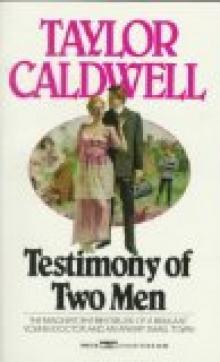 Testimony of Two Men
Testimony of Two Men Wicked Angel
Wicked Angel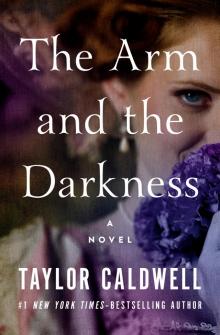 The Arm and the Darkness
The Arm and the Darkness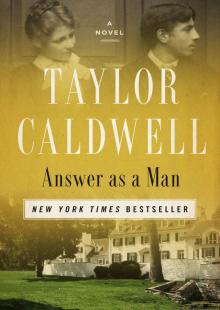 Answer as a Man
Answer as a Man Grandmother and the Priests
Grandmother and the Priests On Growing Up Tough: An Irreverent Memoir
On Growing Up Tough: An Irreverent Memoir Ceremony of the Innocent
Ceremony of the Innocent The Listener
The Listener Bright Flows the River
Bright Flows the River The Earth Is the Lord's
The Earth Is the Lord's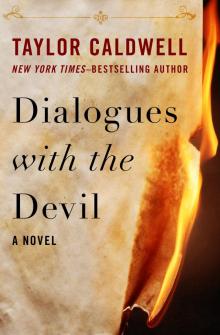 Dialogues With the Devil
Dialogues With the Devil A Tender Victory
A Tender Victory This Side of Innocence
This Side of Innocence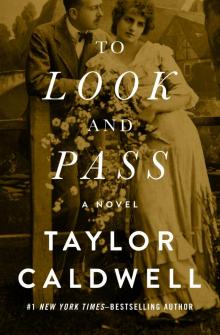 To Look and Pass
To Look and Pass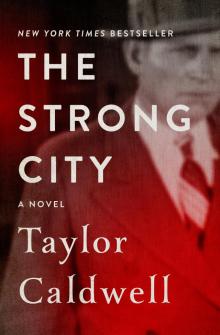 The Strong City
The Strong City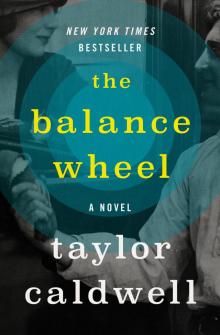 Balance Wheel
Balance Wheel A Pillar of Iron: A Novel of Ancient Rome
A Pillar of Iron: A Novel of Ancient Rome Glory and the Lightning
Glory and the Lightning Dear and Glorious Physician
Dear and Glorious Physician The Wide House
The Wide House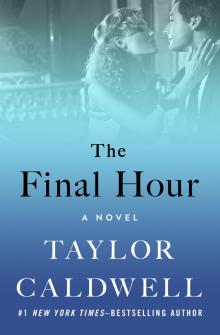 The Final Hour
The Final Hour Never Victorious, Never Defeated
Never Victorious, Never Defeated Unto All Men
Unto All Men The Turnbulls
The Turnbulls Your Sins and Mine: The Terrifying Fable of a World Without Faith
Your Sins and Mine: The Terrifying Fable of a World Without Faith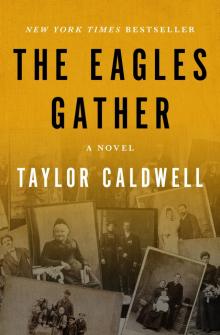 The Eagles Gather
The Eagles Gather Let Love Come Last
Let Love Come Last The Devil's Advocate: The Epic Novel of One Man's Fight to Save America From Tyranny
The Devil's Advocate: The Epic Novel of One Man's Fight to Save America From Tyranny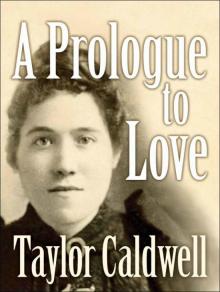 A Prologue to Love
A Prologue to Love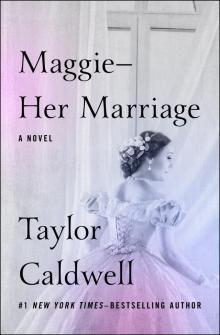 Maggie: Her Marriage
Maggie: Her Marriage The Late Clara Beame
The Late Clara Beame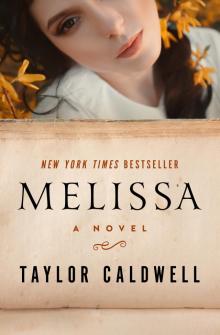 Melissa
Melissa Great Lion of God
Great Lion of God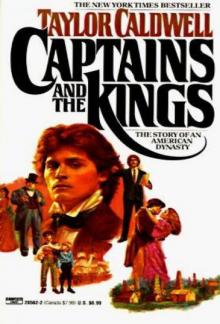 Captains and the Kings
Captains and the Kings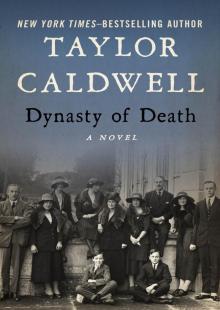 Dynasty of Death
Dynasty of Death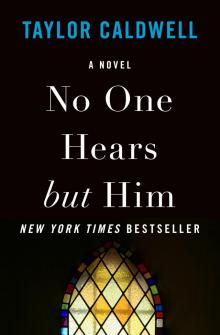 No One Hears but Him
No One Hears but Him The Sound of Thunder
The Sound of Thunder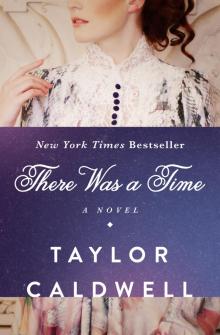 There Was a Time
There Was a Time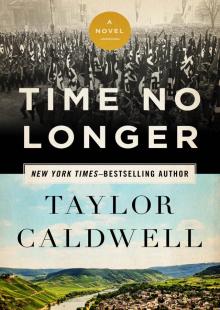 Time No Longer
Time No Longer I, Judas
I, Judas The Devil's Advocate
The Devil's Advocate The Romance of Atlantis
The Romance of Atlantis A Pillar of Iron
A Pillar of Iron On Growing Up Tough
On Growing Up Tough Your Sins and Mine
Your Sins and Mine